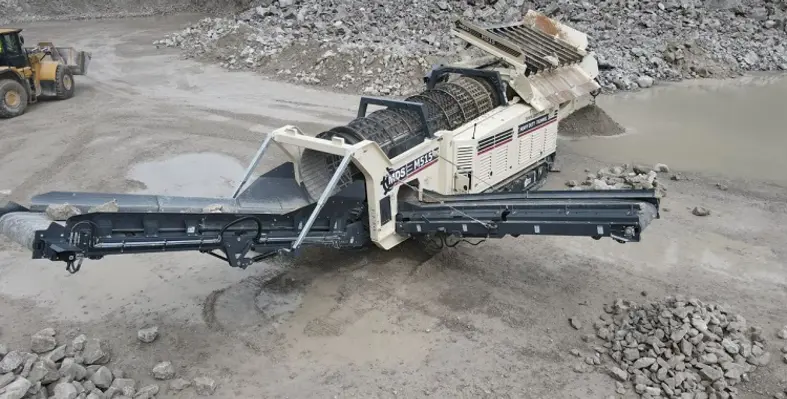Mobile Heavy Duty rock trommels have hit the local market for the first time in Africa, bringing efficient screening mechanisms to unlock mineral bounty faster
In southern Africa, mobile trommels have not been extensively used as the machines have not been readily available to the marked. The arrival of MDS Heavy Duty Track Trommels now brings parity to the market and will allow African mines to process minerals in the same efficient manner as global counterparts.
Due to its rotating barrel design the minerals bearing materials can be manipulated to process easier. For coal and diamonds, the action of the trammel can be used to liberate the minerals and reduce the need for further processing.
Terex-owned MDS recently concluded an exclusive distribution agreement with ELB Equipment, where it will be sold among the likes of its Powerscreen, Terex Minerals Processing and other mining OEM suppliers.
According to Wakefield Harding, ELB Equipment divisional director for mining, the addition of the MDS range of tracked trommels effectively closes the screening loop for its customers with a full range of equipment for any application.
Although static trommels are used in the industry, the arrival of the MDS tracked trommels provide flexibility to move the machine to suit the changing landscape of a mine and reduce handling. With aperture sizes up to 450 mm the trommels can be fed large rock sizes and screened to three different streams if needed.
Although the trommels are application specific and potential users would be required to speak to an ELB Equipment mining expert, Heath Dickson, ELB Equipment product and applications manager, has distinguished some innovative applications that should be examined including:
Coal: In South Africa there is an abundance of coal and low-grade coal with a lot of shale. Putting the low-grade coal through a crusher renders it unusable but putting it through a trommel the coal that is adhering to the shale stays intact and the coal falls off and can be processed as fines as higher-grade coal. This can be done at a tenth of the price of usual crushing and screening methods and more available coal can be liberated and sold rather than ending up on the dump or needing washing to be obtained.
Diamonds: Diamonds sit in the minus 30 to 40 mm fraction where as much as 70% of feedstock is above 30 mm and the trommel can send all minus 50 mm to the diamond processing plant. With the trommel customers can do it all in field and leave all the rest behind as waste. This will reduce wear and tear compared to a conventional scalping plant.
Quarrying: Demand for gabions, ballast, riprap, armour rock etc are increasing and the use of a tracked trommel enables quarries to start with large size rock and screen up to three separate streams without the need for crushing. This results in more available saleable product and dramatically reduces wear and tear of secondary screens if required for smaller sized materials. Depending on the location and projects in the pipeline the trommels can significantly reduce the ROI of the quarry and the equipment.
Borrow pits and recycling: The tracked trommel comes into its own with the ability to process large rocks on site wherever road and railway construction or flood protection requires the use of borrow pits. With the ability to process large rocks in many instances no additional processing is required.












